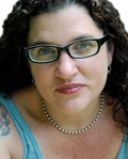Fear
Can You be a Writer AND a Mother?
The opposite of happiness isn't struggle--it's fear and obedience.
Posted April 15, 2010
(The Counselor and Di Prima)
Part One: The Counselor
I don't like those people who tell kids that adolescence is the best years of our lives.
That's a lie.
That's the kind of lie that can really kill you. The kind of lie that makes you feel alone in your depression. The kind of lie that can scare you for a long time.
There were other lies like that.
"I think I want to be a writer," I'd told the career counselor at the junior college where I almost signed up for classes.
I sat across from her in her little brown office. She wore a little brown suit.
She shook her head when I said that and she laughed a quiet and bitter laugh and she let the corners of her mouth turn up into a sneer. Her voice fell an octave when she answered me: "Good luck," is what she said.
I just sat there. I didn't say anything. I glanced over at my baby, asleep in her little blue polka-dotted umbrella stroller.
The counselor sort of leaned back in her plush brown chair then and adjusted her brown jacket and tilted her head to the side like she was maybe trying to pop a vertebrae in her neck and she said, "Miss Gore." And then she looked down at the piece of paper in front of her, maybe trying to remember my name. And she said, "Ariel." She said, "Miss Gore, you have a child to take care of now." She said, "You really ought to make an attempt to come down to earth and think about that. You need to think about your child and ask yourself how you're going to make a living."
I was nineteen.
I nodded a few times too many.
I stood up slow.
Her words made my heart contract, but I still felt compelled to be polite. "Thank you," I said before I grabbed the handles of the umbrella stroller.
I pushed the stroller.
I let myself out of that dumb brown office.
I pushed the stroller.
My pace quickened as I walked away, as I pushed.
The cement path led past the pillars, past the little gardens, toward a green expanse. My walk morphed into a run. Hot tears. I pushed the stroller. The baby slept. She kept on sleeping. I felt like an idiot for telling that woman what I wanted, what I wanted to be. I felt like an idiot for wanting something I had no right to want. For thinking I could do something.
I didn't know how to live, that counselor was right. I didn't know how to make a living.
Writer. What a joke.
Part Two: Di Prima
In Recollections of My Life as a Woman, the poet Diane di Prima tells of a night at Allen Ginsberg's place in New York. She'd gotten a friend to babysit her young daughter and headed over to Ginsberg's apartment because Jack Kerouac and Philip Whalen were in town for "one of those nights with lots of important intense talk about writing you don't remember later."
Well, Diane had promised her babysitter that she'd be back at 11:30 that night, and 11:30 starts rolling around, so Diane bids her farewells. "Whereupon, Kerouac raised himself up on one elbow on the linoleum and announced in a stentorian voice: ‘DI PRIMA, UNLESS YOU FORGET ABOUT YOUR BABYSITTER, YOU'RE NEVER GOING TO BE A WRITER.' "
How do you like that?
Kerouac just props himself up with one arm and drunkenly slaps us with the great fear we all share. He embodies the archetype of the selfish, self-destructive male artist, and he announces that unless we, too, are willing to be irresponsible to our relationships, we'll never quite measure up.
"I considered this carefully, then and later," di Prima writes, "and allowed that at least part of me thought he was right. But nevertheless I got up and went home."
Three cheers for di Prima!
"I'd given my word to my friend," she explains, "and I would keep it. Maybe I was never going to be a writer, but I had to risk it. That was the risk that was hidden (like a Chinese puzzle) inside the other risk of: can I be a single mom and be a poet?"
A serious question, that one. Serious not only for moms but for all of us. Can we be present in our relationships and still do the work we feel called to do? It's like my friend Lynn says: "A woman has to make a real effort not to dissolve into everything
that needs her." Our relationships need us, but we don't want to dissolve. We refuse to dissolve, but we choose also to be responsible to our relationships. We're tired of the drunk guy on the linoleum telling us we can't do both. Women have always done
both.
Looking back, di Prima recognizes what is true: Had she opted to stay that night, "there would be no poems. That is, the person who would have left a friend hanging who had done her a favor, also wouldn't have stuck through thick and thin to the
business of making poems. It is the same discipline throughout."
The same discipline.
And discipline, like motherhood, is good for the soul. Poetry is good for the soul. Responsibility to all our dysfunctional relationships is good for the soul. The archetype of the selfish male artist tells us that we can't manage all these things at once, that we can't be simultaneously responsible to children, babysitters, self, and art, that we have to sacrifice, to abandon-but we know that's a lie.
As I write this, Kerouac has been in his grave for nearly forty years. Diane di Prima is down in San Francisco, mother of five children, author of thirty-five books of poetry and several memoirs, powerhouse, and twenty- first- century radical.
We don't need children to be happy, but motherhood has taught me this: to experience joy, we have to be able to honestly experience darkness, too. In responsibility to relationship, we build bodies of memory and life experience that we can be proud of. Motherhood has taught me that the opposite of happiness isn't struggle. It isn't even depression. The opposite of happiness is fear and obedience.
In Revolutionary Letters, di Prima writes, "Be strong. We have the right to make the universe we dream. No need to fear ‘science' groveling apology for things as they are, ALL POWER TO JOY, which will remake the world."
Three cheers for di Prima, for motherhood, for the courage to make the universe we dream.




